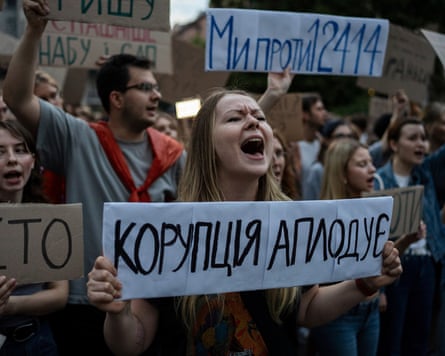Volodymyr Zelenskyy has approved a contentious bill weakening Ukraine’s anti-corruption bodies, according to reports, hours after the first serious protests against his government took place in Kyiv.
The move on Tuesday puts the president on a collision course with civil society activists and some of its veterans and is likely to dismay Ukraine’s European partners.
Earlier on Tuesday Ukraine’s parliament, the Verkhovna Rada, passed a controversial bill that effectively removes the independence of the national anti-corruption bureau, known as Nabu, and the specialised anti-corruption prosecutors office.
It gives sweeping new powers to Ukraine’s prosecutor general, and makes it easier for the government to control which cases are pursued. Critics say the legislation allows political interference and is a major step backwards in the fight against corruption.
Late on Tuesday Zelenskyy signed the bill into law, rejecting calls for him to use his presidential veto, according to reports. The decision has yet to be posted on the government’s website.

Hours earlier, about 1,500 protesters gathered next to Zelenskyy’s presidential administration complex. They shouted slogans outside his window including “Shame” and “Veto the law” and waved homemade banners denouncing the bill.
They were protests in other large cities including Dnipro, Lviv and Odesa. “If the bill goes ahead it will make it harder for Ukraine to join the European Union. We will go back to dictatorship,” Sasha Kazintseva said, speaking before Zelenskyy reportedly gave his approval.
She added: “We don’t want to be like Russia. Zelenskyy is still our president. But when he does the wrong things we will say so.”
Her friend Tetiana Kukuruza held up a cardboard sign with the blunt slogan: “Are you fucking crazy?”
She explained: “This is the first time since 2022 that we’ve taken to the streets. We know the names of the deputies who voted for this bill. I’m not saying they are corrupt. But they have interests.”
The protesters gathered in a park immediately below a rococo 19th-century government building, the House of Chimeras. The crowd was made up of students, young activists and army veterans, some of them draped in blue and yellow Ukrainian flags. Kyiv’s mayor, Vitali Klitschko, also took part, together with his brother
Wladimir.
Veronika Mol, an artist, said she worried Ukraine was sliding back to the era of Viktor Yanukovych, the corrupt pro-Russian president who fled to Moscow in 2014, following months of street protests.
“I’m surprised this has happened. It looks like some madness. I don’t know what their motives are,” she said.
“People are the power in Ukraine. Not the president or government. It’s terrible we still have to remind them,” Mol added.
There has been vocal condemnation of the bill from prominent soldiers, a celebrity chef and Ukraine’s media. The writer Illia Ponomarenko said civil society was fighting “the dark side of its own state” in parallel with the war against Russia.
He criticised “corruption, abuse of power, lies, lack of transparency, nepotism, impunity, and attacks on democracy and freedom of speech – everything that keeps dragging us back toward the abyss, back into Russia’s colonial criminal stable”.
Several of Ukraine’s high-profile international supporters expressed concern. They included the former US ambassador to Moscow, Mike McFaul, and Estonian ex-president Toomas Hendrik Ilves. There was also recognition that protesters could freely voice anti-government opinions – unlike in Russia.
Ukraine’s application to join the EU is dependent on the progress it makes in fighting corruption. Since 2022, EU countries have provided Kyiv with significant military and economic support running into billions of euros.
The European commissioner for enlargement, Marta Kos, criticised the bill’s adoption.
“The dismantling of key safeguards protecting [anti-corruption bureau] Nabu’s independence is a serious step back,” Kos wrote on social media, saying that the two bodies were “essential” for Ukraine’s EU path.

 3 months ago
118
3 months ago
118

















































